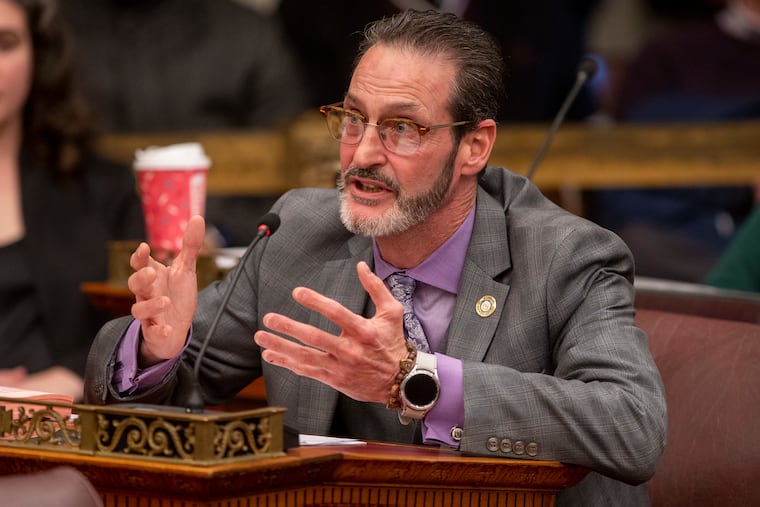Many Philly cleaners lost work as office occupancy plummeted. An updated city law aims to slow that down.
Office building cleaners advocating for the legislation detailed how their staffs have shrunk while more space is converted.

Philadelphia City Council has expanded protections for building workers including janitors and security guards, preventing them from being laid off without advance notice if their building is sold or closed for renovations.
A bill passed Thursday would require that building owners rehire some of the workers displaced during, say, a commercial-to-residential transition. Industry groups have fiercely protested against that provision, arguing that it would take hiring decisions out of the hands of their contractors.
The new protections come as the city’s commercial buildings struggle with high and increasing vacancy rates, pushing some owners to consider converting office space to residential use. The Service Employees International Union 32BJ, which represents office cleaners and security guards, has been pushing for similar protections in other cities.
“The changes are coming, we have to change with the times. It should not be on the backs of working people,” said Daisy Cruz, Mid-Atlantic district leader for 32BJ.
Building owners and property developers say that the bill, which expands on an earlier law passed in 2000, is a heavy-handed intervention that will make it harder to repurpose low-occupancy buildings.
The original ordinance already requires that when a building brings in a new contractor, they must keep the prior firm’s workers employed for at least 90 days. But it didn’t protect workers in instances where a building was closed for renovations.
With lead sponsor Councilmember Jim Harrity’s changes passed on Thursday, the requirements would now apply to additional job categories, like concierge services and door attendants. It requires 60-day notice of a layoff due to building closure and opportunities for reemployment upon reopening. Workers with at least three months on the job, rather than eight under the previous rule, would be protected.
“As a result of the pandemic and working remotely, all the buildings have [seen a] reduction in staff,” Cruz said. “We can’t do anything about that now, but [this bill is] just adding an extra layer of protection.”
At a hearing on April 4, 32BJ members who work in Philadelphia buildings shared how their jobs have been affected by their buildings converting some space from commercial to residential use.
Tiffany Cherry, a cleaner at the Bellevue, said her building increased the amount of residential space by six floors, decreasing commercial space to four floors, and went from nearly two dozen cleaners to five.
“The current legislation protects workers to one during a switch [in contractors], however, if the building closed completely for renovations, I would be out of a job altogether,” Cherry said, also noting, “I would lose my seniority when it comes to time to apply as it reopens.”
Industry leaders testified at the committee hearing earlier this month that the bill as written would be detrimental to local business owners, especially the provision requiring that some workers be rehired after an ownership transition — even if the contracting company has changed.
Regina Hairston, president and CEO of the African-American Chamber of Commerce of Pennsylvania, New Jersey, and Delaware, and William Carter, a vice president with the Chamber of Commerce for Greater Philadelphia, said the bill would create an unfair burden for the owners of cleaning businesses and other building service contractors, including Black and brown business owners.
Hairston said Thursday that she wanted to see amendments to the legislation that would have limited it to office-to-residential conversions only.
“For us, it’s not about the building owners. It’s about the contractors … who really depend on these kinds of opportunities to grow and scale,” Hairston said. “We do not feel we had the opportunity to have our voices heard.”
Some Council members agree, and were unhappy that Harrity left the bill as is after hearing those business concerns.
“I was trying to get an amendment in, but the lawyers said that it would change the original protections that they were granted with the original bill and I didn’t want to take a chance of doing any of that,” said Harrity.
The bill passed 13-2, with Council members Brian J. O’Neill (R.) and Jeffery Young (D.) voting against it. Councilmember Young, who has a pro-union track record, left the Council meeting mid-session but made sure that his nay vote was recorded. He voted against it, he said, because it would hurt Center City’s commercial real estate market, decreasing tax revenue.
“This bill will make it impractical and overly burdensome for property owners and service vendors because it mandates the assumption of employees of the previous owner or vendor, even if there is no work available,” Young said.
Harrity acknowledged that there had been spirited discussion around the lack of amendments, but that he expected Mayor Cherelle L. Parker to sign the bill.
“We always discuss things fairly openly and most of my colleagues’ concerns were addressed,” said Harrity. “It’s passed now, so as far as I’m concerned the issue is handled.”
One of the Council members who voted for the bill, Mike Driscoll, said that there is “absolutely” interest in new legislation to address some industry concerns about the bill and that “conversations [were already] starting.”
Thursday’s bill comes half a year after building owners and 32BJ agreed to a new contract, which included wage increases of 18.6% over four years. It came without cuts to workers’ hours, which union members worried would be on the table because of post-COVID industry pressures. The building owners were able to give raises because they did not have to make additional contributions to health and retirement benefits and because the number of members covered by the contract had declined.